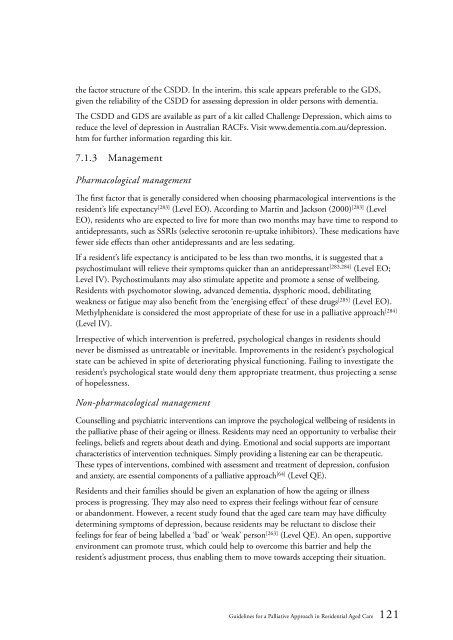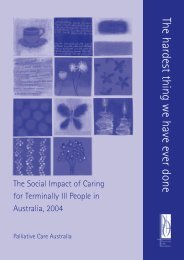Guidelines for a Palliative Approach in Residential Aged Care
Guidelines for a Palliative Approach in Residential Aged Care
Guidelines for a Palliative Approach in Residential Aged Care
You also want an ePaper? Increase the reach of your titles
YUMPU automatically turns print PDFs into web optimized ePapers that Google loves.
the factor structure of the CSDD. In the <strong>in</strong>terim, this scale appears preferable to the GDS,<br />
given the reliability of the CSDD <strong>for</strong> assess<strong>in</strong>g depression <strong>in</strong> older persons with dementia.<br />
The CSDD and GDS are available as part of a kit called Challenge Depression, which aims to<br />
reduce the level of depression <strong>in</strong> Australian RACFs. Visit www.dementia.com.au/depression.<br />
htm <strong>for</strong> further <strong>in</strong><strong>for</strong>mation regard<strong>in</strong>g this kit.<br />
7.1.3 Management<br />
Pharmacological management<br />
The first factor that is generally considered when choos<strong>in</strong>g pharmacological <strong>in</strong>terventions is the<br />
resident’s life expectancy [283] (Level EO). Accord<strong>in</strong>g to Mart<strong>in</strong> and Jackson (2000) [283] (Level<br />
EO), residents who are expected to live <strong>for</strong> more than two months may have time to respond to<br />
antidepressants, such as SSRIs (selective seroton<strong>in</strong> re-uptake <strong>in</strong>hibitors). These medications have<br />
fewer side effects than other antidepressants and are less sedat<strong>in</strong>g.<br />
If a resident’s life expectancy is anticipated to be less than two months, it is suggested that a<br />
psychostimulant will relieve their symptoms quicker than an antidepressant [283,284] (Level EO;<br />
Level IV). Psychostimulants may also stimulate appetite and promote a sense of wellbe<strong>in</strong>g.<br />
Residents with psychomotor slow<strong>in</strong>g, advanced dementia, dysphoric mood, debilitat<strong>in</strong>g<br />
weakness or fatigue may also benefit from the ‘energis<strong>in</strong>g effect’ of these drugs [285] (Level EO).<br />
Methylphenidate is considered the most appropriate of these <strong>for</strong> use <strong>in</strong> a palliative approach [284]<br />
(Level IV).<br />
Irrespective of which <strong>in</strong>tervention is preferred, psychological changes <strong>in</strong> residents should<br />
never be dismissed as untreatable or <strong>in</strong>evitable. Improvements <strong>in</strong> the resident’s psychological<br />
state can be achieved <strong>in</strong> spite of deteriorat<strong>in</strong>g physical function<strong>in</strong>g. Fail<strong>in</strong>g to <strong>in</strong>vestigate the<br />
resident’s psychological state would deny them appropriate treatment, thus project<strong>in</strong>g a sense<br />
of hopelessness.<br />
Non-pharmacological management<br />
Counsell<strong>in</strong>g and psychiatric <strong>in</strong>terventions can improve the psychological wellbe<strong>in</strong>g of residents <strong>in</strong><br />
the palliative phase of their age<strong>in</strong>g or illness. Residents may need an opportunity to verbalise their<br />
feel<strong>in</strong>gs, beliefs and regrets about death and dy<strong>in</strong>g. Emotional and social supports are important<br />
characteristics of <strong>in</strong>tervention techniques. Simply provid<strong>in</strong>g a listen<strong>in</strong>g ear can be therapeutic.<br />
These types of <strong>in</strong>terventions, comb<strong>in</strong>ed with assessment and treatment of depression, confusion<br />
and anxiety, are essential components of a palliative approach [64] (Level QE).<br />
Residents and their families should be given an explanation of how the age<strong>in</strong>g or illness<br />
process is progress<strong>in</strong>g. They may also need to express their feel<strong>in</strong>gs without fear of censure<br />
or abandonment. However, a recent study found that the aged care team may have difficulty<br />
determ<strong>in</strong><strong>in</strong>g symptoms of depression, because residents may be reluctant to disclose their<br />
feel<strong>in</strong>gs <strong>for</strong> fear of be<strong>in</strong>g labelled a ‘bad’ or ‘weak’ person [263] (Level QE). An open, supportive<br />
environment can promote trust, which could help to overcome this barrier and help the<br />
resident’s adjustment process, thus enabl<strong>in</strong>g them to move towards accept<strong>in</strong>g their situation.<br />
<strong>Guidel<strong>in</strong>es</strong> <strong>for</strong> a <strong>Palliative</strong> <strong>Approach</strong> <strong>in</strong> <strong>Residential</strong> <strong>Aged</strong> <strong>Care</strong> 121
















